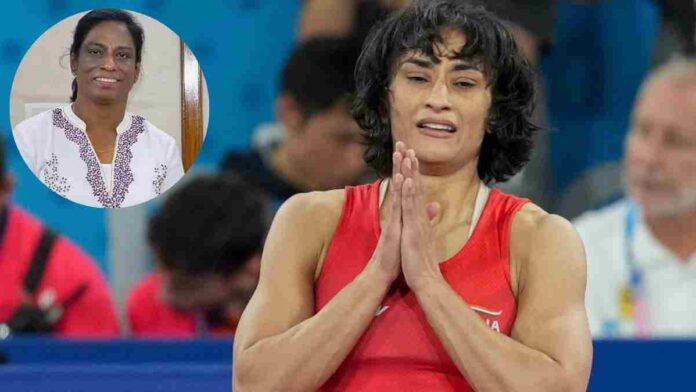PT Usha and Vinesh Phogat : In a recent controversy that has sparked significant debate in the sports community, Indian Olympic Association (IOA) President PT Usha addressed the fallout from Vinesh Phogat’s weigh-in incident with a clear and firm stance. The 29-year-old wrestler was disqualified before her gold-medal bout in the freestyle 50kg category after being found 100 grams overweight during the morning weigh-in. Speaking out on Sunday, Usha emphasized that it is ultimately the athlete’s responsibility to manage their weight and meet competition requirements. She further condemned attacks on the IOA’s medical team, particularly singling out Chief Medical Officer Dr. Dinshaw Pardiwala for unwarranted criticism.
Despite the disappointment of Phogat’s disqualification, PT Usha adopted a positive tone by underscoring the importance of personal accountability and professionalism in competitive sports. She highlighted that while emotional reactions are understandable given high-stakes scenarios, targeting medical professionals who are committed to athletes’ well-being is both unacceptable and worthy of condemnation. Vinesh Phogat’s situation serves as an important reminder for athletes to meticulously adhere to standards set forth by sporting bodies, ensuring fair play and preparation.
Read More : What Really Happened? Inside Vinesh Phogat’s Paris Olympics 2024 Disqualification!
The wrestling community had been eagerly anticipating Vinesh’s performance in what promised to be an exciting gold-medal match; however, this setback does not overshadow her previous accomplishments or diminish her potential future successes. As discussions continue around this incident, PT Usha remains optimistic about fostering an environment where athletes can learn from their experiences while maintaining mutual respect among all stakeholders involved in Indian athletics.
In a recently released statement, sports authority Usha emphasized that the responsibility of managing the weight of athletes in sports like wrestling, weightlifting, boxing, and judo falls squarely on the shoulders of each athlete and their coaches. This clarification comes amidst a wave of criticism directed at Dr. Dinshaw Pardiwala, the Chief Medical Officer appointed by the Indian Olympic Association (IOA), and his medical team. Usha strongly condemned this backlash as unacceptable and urged those quick to cast aspersions to first consider all facts before reaching any conclusions.
Usha’s assertion highlights an ongoing debate within the sporting community about who holds primary accountability for an athlete’s physical readiness. While some argue that medical teams should play a more significant role in monitoring and guiding athletes’ health metrics, including weight management, others believe that such responsibilities inherently belong to athletes and their coaching staff. In her statement, Usha reiterated that blaming Dr. Pardiwala’s team detracts from an important aspect of athletic discipline – personal accountability by both athletes and coaches for maintaining optimal competitive condition.
Read More : Exclusive: Inside Hardik Pandya’s Emotional Journey to World Cup
The heightened scrutiny faced by Dr. Pardiwala comes at a time when increasing attention is being paid to athlete welfare and performance sustainability in high-stakes competitions. Despite this pressure, Usha hopes her remarks will redirect focus onto more constructive discussions around collaboration between medical experts and coaching teams rather than fostering divisive blame games. She also called for greater understanding within the community regarding who is truly responsible for different aspects of athletic preparation – emphasizing clarity over scapegoating as essential for future sporting success.
In a significant development in the sports world, Indian wrestler Vinesh Phogat has filed an appeal with the Court of Arbitration for Sports (CAS), demanding that she be awarded a joint silver medal with Cuban wrestler Yusneylis Guzman Lopez. This appeal comes after Phogat’s controversial victory over Lopez, who was later disqualified due to unspecified reasons. The International Olympic Association (IOA) had earlier taken proactive steps by appointing a specialized medical team aimed at enhancing athletes’ recovery and injury management during and post-competition phases.
The medical team’s creation was meant to bridge the gap for athletes lacking personal nutritionists and physiotherapists, an initiative reflecting IOA’s commitment to holistic athlete care. This support system has proven crucial for many athletes, including Phogat, who has faced multiple injuries throughout her career. As she navigates her legal battle at CAS, this ongoing medical assistance underscores the importance of comprehensive athlete welfare mechanisms in competitive sports.
Phogat’s pursuit of a joint silver medal reflects broader issues within international wrestling adjudication standards and raises questions about fair play and recognition in sports. By bringing this case to CAS, Phogat seeks not only personal vindication but also aims to set a precedent that could impact future rulings on similar disputes. Meanwhile, the IOA’s newly appointed medical team continues its mission to ensure all athletes receive equitable support regardless of their access to private healthcare resources.

